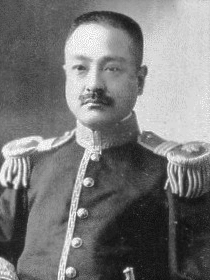Enkichi ŇĆki on:
[Wikipedia]
[Google]
[Amazon]
 Count was a Japanese statesman in the TaishŇć period.
ŇĆki was born in
Count was a Japanese statesman in the TaishŇć period.
ŇĆki was born in
'' Time (magazine), Time'' January 14, 1924
 Count was a Japanese statesman in the TaishŇć period.
ŇĆki was born in
Count was a Japanese statesman in the TaishŇć period.
ŇĆki was born in Tokyo
Tokyo (; ja, śĚĪšļ¨, , ), officially the Tokyo Metropolis ( ja, śĚĪšļ¨ťÉĹ, label=none, ), is the capital and largest city of Japan. Formerly known as Edo, its metropolitan area () is the most populous in the world, with an estimated 37.468 ...
. His father, ŇĆki TakatŇć
, was a Japanese statesman during the early Meiji period. He was Governor of Tokyo in 1868 and a member of the Japanese Privy Council in 1889.Nussbaum, Louis-Fr√©d√©ric. (2005). "ŇĆki TakatŇć" in .
Biography
ŇĆki was born into a ''samurai' ...
was one of the leaders in the Meiji Restoration
The , referred to at the time as the , and also known as the Meiji Renovation, Revolution, Regeneration, Reform, or Renewal, was a political event that restored practical imperial rule to Japan in 1868 under Emperor Meiji. Although there were ...
, and served in numerous cabinet posts in the early Meiji government
The was the government that was formed by politicians of the Satsuma Domain and ChŇćshŇę Domain in the 1860s. The Meiji government was the early government of the Empire of Japan.
Politicians of the Meiji government were known as the Meiji o ...
. In 1899, Enkichi succeeded to his father’s title of count (''hakushaku'') under the ''kazoku
The was the hereditary peerage of the Empire of Japan, which existed between 1869 and 1947. They succeeded the feudal lords () and court nobles (), but were abolished with the 1947 constitution.
Kazoku ( ŤŹĮśóŹ) should not be confused with ' ...
'' peerage system. His political career began in 1908, when he was elected to the House of Peers. He initially supported the '' KenkyŇękai'', but soon switched his allegiance to the ''Rikken SeiyŇękai
The was one of the main political parties in the pre-war Empire of Japan. It was also known simply as the ''SeiyŇękai''.
Founded on September 15, 1900, by ItŇć Hirobumi,David S. Spencer, "Some Thoughts on the Political Development of the Japane ...
''. He was appointed Justice Minister under the cabinet of Prime Minister
A prime minister, premier or chief of cabinet is the head of the cabinet and the leader of the ministers in the executive branch of government, often in a parliamentary or semi-presidential system. Under those systems, a prime minister is not ...
Hara
Hara may refer to:
Art and entertainment
* Hara (band), a Romanian pop-band
* ''Hara'' (film), a 2014 Kannada-language drama film
* ''Hara'' (sculpture), a 1989 artwork by Deborah Butterfield
* Goo Hara (1991-2019), South Korean idol singer
...
, a post which he also held under the succeeding Takahashi
is the third most common Japanese surname. Less common variants include , , , , , , , and . Notable people with the surname include:
* Aaron Takahashi, American actor
* , Japanese singer and actress
* , Japanese kickboxer
* , Japanese classica ...
administration. In 1923, he cooperated with Home Minister
The Minister of Home Affairs (or simply, the Home Minister, short-form HM) is the head of the Ministry of Home Affairs of the Government of India. One of the senior-most officers in the Union Cabinet, the chief responsibility of the Home Minist ...
Tokonami TakejirŇć to introduce tightened anti-subversive legislature in response to increasing leftist agitation in the labor disputes, and the public emergence of the Japan Communist Party. ŇĆki was subsequently Railroad Minister under the KatŇć and Kiyoura administrations.'' Time (magazine), Time'' January 14, 1924
References
* Minichiello. Sharon. Japan's ''Competing Modernities: Issues in Culture and Democracy, 1900-1930.'' University of Hawaii Press, 1998Notes
{{DEFAULTSORT:Oki, Enkichi 1871 births 1926 deaths Politicians from Tokyo Government ministers of Japan Ministers of Justice of Japan Members of the House of Peers (Japan) Kazoku Rikken SeiyŇękai politicians 20th-century Japanese politicians